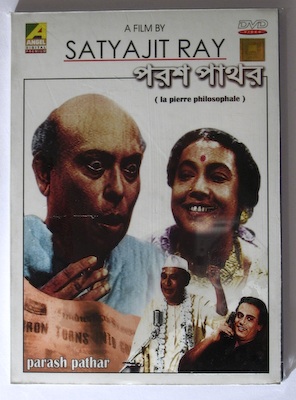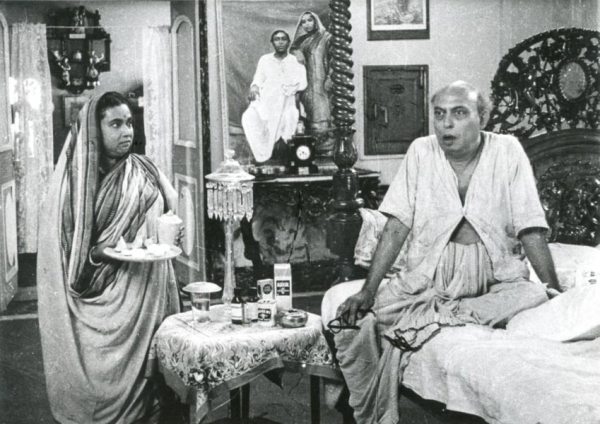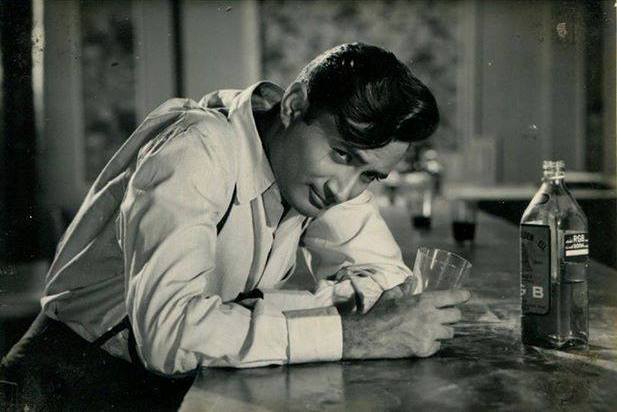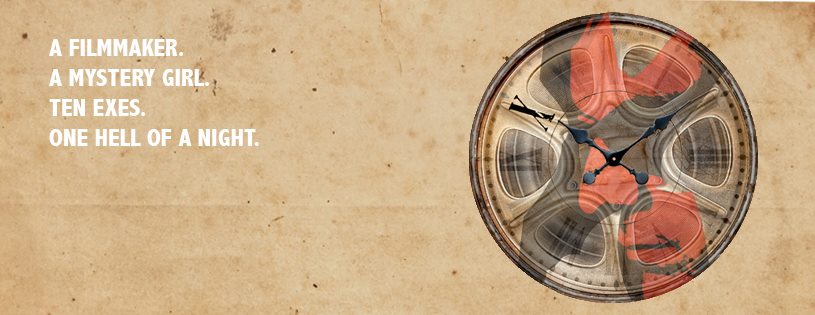Directed by Satyajit Ray
Produced by Pramod Lahiri
Screenplay by Satyajit Ray
Based on Short story Paras Pathar by Parasuram (Rajsekhar Bose)
Starring Tulsi Chakravarty, Ranibala Devi, Kali Bannerjee, Jahar Roy, Gangapada Basu,
Haridhan Mukherjee, Bireswar Sen, Moni Srimani, Chhabi Biswas, Pahari Sanyal
Music by Ravi Shankar
Cinematography Subrata Mitra
Edited by Dulal Dutta
Release dates 17 January 1958
Running time 111 Mins
Language Bengali
Though perhaps lacking in the depth and multi-layered richness of his later films or his Apu Trilogy, Satyajit Ray’s Parash pathar (“Philosopher’s stone”) is a simple, familiar story, delicately and charmingly told. It’s everyman protagonist, Paresh chandra Dutta (Tulsi Chakravarty), is middling in every way – middle class, middle aged, spreading around the middle, a middling bureaucrat with a better than middling chance of losing his job in the near future.
When Pareshchandra finds a stone that can transform ordinary objects into gold, he begins to fantasize about how the windfall can change his life, and even his daydreams are modest. He imagines himself saluting an honor guard of Indian soldiers; he dreams of a garlanded statue in his memory standing humbly in a city park. Even when he leverages his easy wealth to a place of recognition and adulation in high society, he does so with positive, not negative, influence: He supports cultural programs that celebrate Bengali heritage and makes generous charitable donations even to the most humble of causes. While he moves himself and his wife into a gracious bungalow, he maintains the same solitary servant (Jahar Roy) who had worked for him in his cramped, crumbling flat. This servant – hilariously – hurries to change clothes as he rushes from one role to the next, driver to butler to chai-server. Even as a grand man, Paresh Chandra remains simply hewn and relatable.
How far out of his element Paresh Chandra has ventured becomes clear when his young assistant Priyotosh (Kali Banerjee) tells him he has been invited to a cocktail party. Paresh Chandra beams like a child; he seems never to have experienced anything as thrilling as a cocktail party in his life, and he skips from the office exclaiming “Cocktail! Cocktail!”, trying on the unfamiliar idea with delight. At the party, though, he is awkward and unsuited. He fails to make conversation with any of the other guests. He becomes desperately drunk (in a drunk scene too vividly real and viscerally stomach-churning to be especially funny), and in a frantic bid to remain interesting to the high-society crowd, reveals the supernatural source of his wealth. Paresh chandra’s downfall from here is unsurprising to anyone familiar with this kind of story, from any culture.
In the greater society’s response to this revelation of instant gold for the taking, Parash pathar finally begins to take on some of the broader allegorical significance that one expects of Ray films. The rich react with greed (which the modest Paresh Chandra had himself mostly avoided), and society at large reacts with hysteria, throwing the gold market into chaos. It is easy to read this as a thin allegory for the function of world economies, especially for a film made at a time when many nations were debating the abandonment of the gold standard (though India itself was on a different precious-metal standard, silver).
For the most part, though, Parash pathar is a straightforward, unnuanced, and very funny fable about the dangers of greed and the non-negotiable truth that there is no such thing as a free lunch. What makes it most enjoyable are the touches of Ray’s nascent craft – his use of surprising camera angles, a restrained and unusually light and evocative soundtrack, and his willingness to let Tulsi Chakravarty play to the cheap seats. Chakravarty is by no means a pretty man, but he is a master of broad, expressive physical comedic acting. His bulging eyes, fishy, fleshy lips, and enormous pot belly are almost characters in their own right. The way Charkavarty controls them, delivering their lines in perfect complement, elevates this simple fable into memorable cinematic and comedic art.
Written By- Carla Miriam Levy
DISCLAIMER: The views expressed are solely of the author and Bollywoodirect.com do not necessarily subscribe to it. Bollywoodirect.com shall not be responsible for any damage caused to any person/organisation directly or indirectly.




